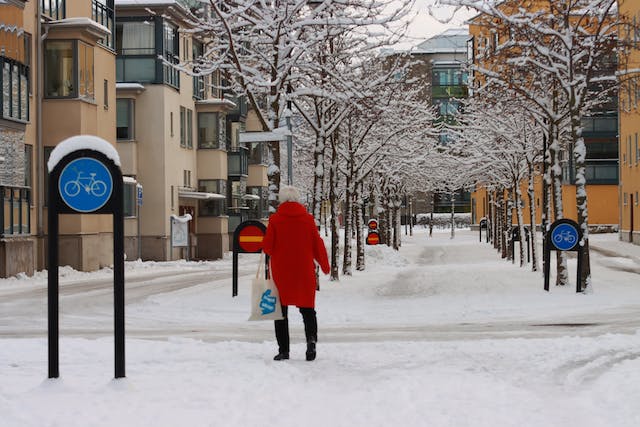Winter commercial property maintenance is crucial to ensure the safety of occupants and protect the property’s integrity.
Here are some essential steps in preparing commercial properties for winter, emphasizing the importance of proactive planning and maintenance:
Inspect and Maintain Heating Systems
The most important consideration when preparing commercial properties for winter is ensuring that the heating systems are in optimal condition. Regular maintenance and inspection of boilers, furnaces, heat pumps, and ductwork are essential to prevent breakdowns during the coldest months.
Commercial property owners should schedule professional inspections, clean filters, and replace worn-out parts as necessary. Adequate heating keeps occupants comfortable and prevents frozen or burst pipes, which can result in costly damage.
Weatherproofing and Insulation
Effective weatherproofing and insulation are critical in maintaining a comfortable and energy-efficient indoor environment. You should check your property for drafts and gaps around windows, doors, and other openings.
Seal any cracks or openings to prevent heat loss and reduce energy consumption. Additionally, consider upgrading insulation in walls and roofs to improve energy efficiency and reduce heating costs. This will also help with reducing operating costs in the common areas.
Snow and Ice Removal Plan
A comprehensive snow and ice removal plan is essential for safe access to commercial properties during winter. This plan should include the following components:
- Snow removal contracts: Secure contracts with reputable snow removal companies to ensure prompt and efficient clearing of parking lots, walkways, and driveways.
- Salting and de-icing: Stock up on salt and de-icing materials to prevent slippery surfaces. It would help if you marked treated areas to guide pedestrians safely.
- Snow removal equipment: Ensure that snowplows, shovels, and other equipment are in good working condition and readily available.
- Emergency snow removal: Establish protocols for addressing unexpected heavy snowfall or ice accumulation.
Roof and Gutter Maintenance
Roof and gutter maintenance is often overlooked but is crucial for preventing costly damage. Snow accumulation on roofs can lead to structural problems or leaks if not properly managed.
Regularly inspect roofs for signs of damage, such as loose or missing shingles. Clean gutters and downspouts to prevent ice dams, which can cause water to seep into the building. As with any repairs done to your property, you should keep a record of the maintenance activities and the contractors performing the work.
Protect Water Pipes
Frozen pipes are a common and expensive winter problem. Preventive measures include insulating pipes in unheated areas, maintaining consistent indoor temperatures, and allowing faucets to drip during extremely cold nights. In addition, property owners should know the location of shut-off valves in case of emergencies.
Emergency Preparedness
Commercial property owners should have a well-defined emergency plan for extreme weather incidents. This plan should include procedures for addressing power outages, HVAC system failures, and tenant communication. Emergency kits with flashlights, blankets, and non-perishable food items should also be readily available.
Security During the Winter Months
Securing commercial properties for winter is not just about maintaining comfort and efficiency but also about ensuring the safety and security of the premises. Winter weather can pose unique security challenges, and property owners and managers must proactively address these issues. Here are some tips:
Adequate Lighting
The shorter days and longer nights of winter create opportunities for security breaches. Insufficient lighting can make your property vulnerable to theft, vandalism, and unauthorized access.
To combat this, ensure all exterior areas, including parking lots, walkways, and entrances, are well-lit. Consider installing motion-activated lights that deter potential intruders and save energy.
Surveillance Systems
Modern surveillance systems — including security cameras and alarms — are essential for securing commercial properties during winter. Ensure your surveillance system is in good working order, with clear camera views covering critical areas.
Regularly review recorded footage to detect any unusual activity. Additionally, consider investing in smart security systems with a total connect video monitoring feature, enabling quick responses to security threats.
Access Control
Implement access control measures such as key card systems or electronic door locks. Ensure all access points are secure and regularly update access permissions for employees and tenants. Consider installing security barriers or gates at entry points to restrict unauthorized access further.
Security Personnel
Hiring security personnel during winter can be a proactive step. Security guards can monitor the property, respond to emergencies, and provide a visible deterrent to potential intruders. Their presence can be especially beneficial during periods of extreme weather when the property may be more vulnerable.
Talking to Your Tenants
As winter approaches, property managers are responsible for preparing commercial properties and ensuring tenants are ready to face the challenges of the colder season.
Communication
Open and transparent communication with tenants is the foundation of a successful winter preparedness plan. Start by sending out winter preparation guidelines and checklists well in advance.
Provide information on important dates, such as when inspectors will check the heating systems or when snow removal services will commence. Encourage tenants to report any maintenance issues or concerns promptly.
Winter Maintenance Responsibilities
Clearly outline the responsibilities of both property management and tenants when it comes to winter maintenance. Explain who is responsible for removing snow and ice, keeping walkways clear, and reporting heating system malfunctions. A well-defined list of responsibilities ensures everyone knows their role in maintaining a safe and comfortable environment.
Heating System Instructions
Provide tenants detailed instructions on operating and maintaining their units’ heating systems. Explain thermostat settings, how to change air filters, and what to do in case of heating system malfunctions. Encourage tenants to set their thermostats to a reasonable temperature to prevent freezing pipes and minimize energy consumption.
Minimizing Potential Problems During Winter
Preparing commercial properties for winter is a multi-step task that demands careful planning and proactive maintenance. The proper steps can safeguard assets, protect occupants, and minimize potential repair costs associated with winter weather challenges — and a commercial property management solution like STRATAFOLIO can help managers stay on top of all of these tasks. A well-prepared commercial property keeps its businesses thriving, maximizing your bottom line.








